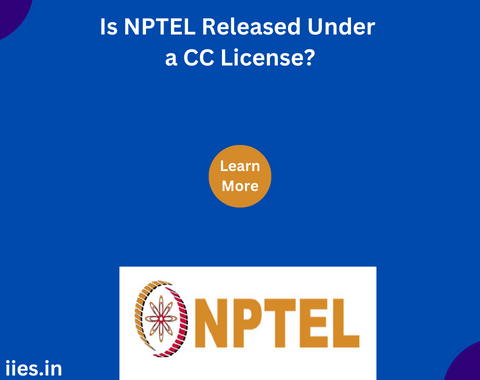Over the years, NPTEL has evolved into one of the largest repositories of open educational resources globally, with thousands of video lectures, course materials, and assignments freely accessible to learners.
One of the key aspects of open educational resources is the licensing framework governing their use, redistribution, and modification. Creative Commons licenses have emerged as a popular choice among content creators seeking to share their work while retaining certain rights. These licenses offer a spectrum of permissions, ranging from allowing unrestricted use with proper attribution to more restrictive terms that prohibit commercial use or derivative works.
So, is NPTEL content released under a CC license? The answer requires a nuanced understanding of NPTEL’s policies and the licensing arrangements governing its content.
NPTEL provides its course materials through its website and other platforms, including YouTube, where lectures are often uploaded. While NPTEL encourages the free dissemination of its resources, it does not explicitly state that its content is licensed under a Creative Commons license. Instead, NPTEL asserts its copyright over the course materials, indicating that users must adhere to certain terms and conditions.
The absence of a CC license on NPTEL’s content raises questions about the extent to which users can legally utilize and redistribute the materials. Without a clear licensing framework, users may be uncertain about their rights and obligations when using NPTEL resources.
However, it’s essential to recognize that the absence of a CC license does not necessarily mean that NPTEL content is completely closed or unavailable for reuse. NPTEL’s website states that its materials are meant for individual use and may not be redistributed for commercial purposes without explicit permission. This suggests a degree of openness, albeit with certain restrictions.
Furthermore, NPTEL allows educational institutions to use its content for non-commercial purposes, subject to certain conditions. This provision aligns with the principles of open education and encourages the integration of NPTEL resources into institutional teaching and learning activities.
Despite the absence of a CC license, NPTEL‘s commitment to open access is evident through its efforts to provide free and accessible educational resources to learners worldwide. The platform’s extensive collection of video lectures, lecture notes, and assignments has undoubtedly enriched the educational experiences of countless individuals, particularly in the field of technical education.
However, the lack of a standardized licensing framework such as Creative Commons may hinder the broader adoption and reuse of NPTEL content, especially in contexts where clarity regarding permissions and obligations is crucial.
In contrast, many other OER initiatives explicitly release their content under Creative Commons licenses, providing clear guidelines for users regarding the permissible uses of the materials. These licenses not only facilitate the legal reuse and adaptation of content but also promote collaboration and innovation within the educational community.
Moving forward, NPTEL could consider adopting a more explicit licensing framework, such as Creative Commons, to enhance the accessibility and usability of its resources. By doing so, NPTEL would not only align itself more closely with global standards for open educational resources but also provide greater clarity and legal certainty to users.
One of the primary advantages of using Creative Commons licenses is the clarity they provide regarding permissible uses of the content. By selecting a specific CC license, content creators can communicate their intentions regarding reuse, modification, and commercial use in a standardized format that is easily understood by users worldwide. This clarity can be particularly valuable for educators, researchers, and learners who rely on OER for their educational endeavors.
Additionally, Creative Commons licenses offer flexibility, allowing content creators to tailor the permissions and restrictions according to their preferences. For instance, a CC BY (Attribution) license permits unrestricted use of the material, provided proper attribution is given to the original creator. On the other hand, a CC BY-NC-SA (Attribution-NonCommercial-ShareAlike) license allows for non-commercial use and derivative works, but with the condition that any new creations must be shared under the same license.
By adopting a Creative Commons licensing framework, NPTEL could provide users with greater clarity and flexibility regarding the use of its content. This could encourage broader adoption and adaptation of NPTEL materials by educators, institutions, and learners, leading to increased innovation and collaboration within the educational community.
Furthermore, embracing Creative Commons licenses could enhance NPTEL’s compatibility with other OER initiatives and platforms that adhere to similar licensing standards. This interoperability could facilitate the exchange of resources and foster a more interconnected ecosystem of open educational materials, benefiting learners and educators globally.

